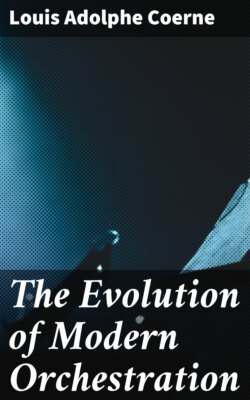Читать книгу The Evolution of Modern Orchestration - Louis Adolphe Coerne - Страница 22
На сайте Литреса книга снята с продажи.
II.
ОглавлениеTable of Contents
It is remarkable that the direct successors of Monteverde should have been more or less blind to the latent powers of this newly vitalized organism,—this prototype of the modern orchestra. Even Carissimi (1604) cannot be included among the progressive writers for the orchestra, indeed, his art of scoring stands lower than Monteverde's. Of course, in the development of oratorio, his dramatic influence was of great importance. He caused the monodic style to advance rapidly, by infusing into recitativo and the aria more spontaneity, into instrumental accompaniment greater interest. Though inferior to Monteverde in originality, Carissimi evinced a keener appreciation for plastic and tonal effects. His eminent pupil, Cesti (1620), is likewise to be remembered less for his instrumentation than for his further development of recitativo and the da capo aria in connection with the operatic stage.
On the other hand, Cavalli (1600), apart from the fortuitous influence his sojourn at the court of Louis XIV had upon Lulli, inherited a more decided talent for orchestration from Monteverde, whose pupil he was. His interesting experiments in writing accompaniments for two violins and a bass established a precedent that survived the test of many years. Like Monteverde, his instincts were strongly dramatic, but perhaps his connection with St. Mark's Church modified his style of writing for the orchestra. For more especially his a capella sacred works are imbued with considerable warmth of expression, and show sentient regard for melody, rhythm, and form. And thus, even as Carissimi displayed but little feeling for purely instrumental effects, though holding a unique position as a composer of oratorio, so Cavalli must be regarded as primarily a dramatic writer,—indeed, among the immediate successors of Monteverde, he alone succeeded in substantially furthering dramatic development in Italy, that is to say, the development of dramatic ideals as had been attempted by the Florentine neophytes of Greek tragedy. For as Langhans expresses it: "After him Italian opera gradually diverges from the path originally taken, and sacrifices the antique simplicity aimed at by its founders to the ever increasing demand for sensuous charm. The alliance of poetry and music, dissolved in the Middle Ages and renewed but a few decades before, is again broken off, and the equilibrium that had just been acquired is sacrificed anew to the claims of music."
